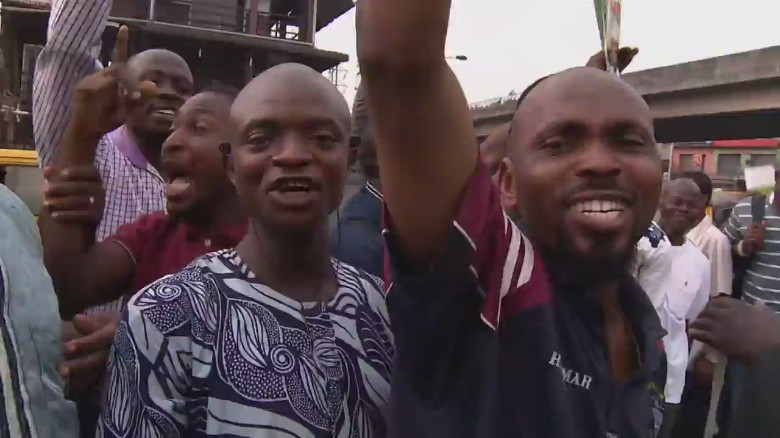After a winner is declared for that ward, all ballots are later sent to a national collation center for verification.
Overall results are expected 48 hours after voting is completed, which now translates to Tuesday.
Boko Haram-blamed attacks
At least 11 people were killed Saturday and two more injured in attacks apparently by Boko Haram extremists at polling stations in the northeastern state of Gombe, residents said.
Boko Haram is a terrorist group in Nigeria seeking to create Sharia, or Islamic law.
In the Dukku village, three voters were killed at a polling station, and a lawmaker in the Gombe state House of Assembly was killed in his home, residents said. A chief of the nearby Tilen village was also killed at home.
A voter and two other people were killed in the Birin Fulani village, residents and police said.
In the Shole village in the Nafada district, two people were killed as residents lined up to vote in morning, residents said.
In the Birin Bolawa village, one person was killed, and election materials were set afire after officials fled a polling station, according to one official who escaped.
“They kept saying, ‘Didn’t we warn you to stay clear of polling stations?‘ ” said Birin Fulani resident Baidu Lawan, who confirmed the killing of one resident.
In other attacks not related to voting, suspected Boko Haram militants decapitated 23 people in a raid Saturday night on Buratai village in northeast Nigerian Borno state, according to residents and Ibrahim Adamu, a local politician in the village.
A hacking
A group of hackers took responsibility for taking over the website of the Nigeria Independent Electoral Commission.

“[!] Strucked by Nigerian Cyber Army[!],” the hackers’ message said on the website, until the site was taken down entirely late Saturday afternoon. “Sorry xD Your site has been stamped by TeaM Nigerian Cyber Army. Feel some shame admin!! Security is just an illusion.”
Curiously, the lengthy message then encouraged Nigerians to “go and cast your vote.”
The website remained inaccessible late Saturday afternoon.
The commission took to Twitter to acknowledge the hack: “We are aware of the recent hack of our @inecnigeria website, we are currently investigating this incident.”
Intense election in oil-rich nation
The vote for a Nigerian leader comes after weeks of delays caused by the Islamist insurgency, and analysts see it as the most tightly contested since military rule ended 16 years ago.
There are 14 presidential candidates on the ballot, but the race comes down to a rematch between incumbent President Jonathan and former military ruler Muhammadu Buhari. The two faced off in the last election in 2011.
In addition to the presidential elections, Nigerians are voting for governors in 36 states.
Though the stakes are high in this election amid intensified attacks by Boko Haram, there are other issues at play, including the economy and corruption.
Nigeria overtook South Africa as the continent’s largest economy last year.
It relies on oil for 70% of its income and needs a price of nearly $120 a barrel to balance its budget, according to Deutsche Bank.
The oil slump, however, has taken world prices below $43 a barrel, their lowest level in six years, and that has placed the economy under severe strain.
Also, U.S. imports of crude oil and petroleum products from Nigeria plunged to just 1.7 million barrels in November,compared to 36.4 million barrels in July 2010, according to the U.S. Energy Information Administration.
Many complain the country’s vast wealth from oil exports does not trickle down to the average citizen.
As many as 70% of Nigerians live below the poverty line and survive on less than a dollar a day.
Security takes center stage
Nigeria is also under economic pressure because of a weakened currency. Corruption has been a hindrance to building a stable economy despite years of democracy, analysts say.
But security has taken center stage as Boko Haram seeks to extend its tentacles with its recent pledge of allegiance to ISIS.
Just this year alone, the extremists have killed at least 1,000 civilians, Human Rights Watch says.
One of the militants’ most brutal acts was the kidnapping of nearly 300 schoolgirlslast April, a majority of whom are still missing. Boko Haram has become increasingly brazen, seizing towns in bloody attacks and declaring them Islamic caliphates.
‘Successes here and there’
Nigeria has teamed up with neighboring Chad and Cameroon in a counteroffensive against the terror group. It appears to be working, with its military saying it has recaptured several key cities.
Although the current government is “having successes here and there” in its fight against Boko Haram, it’s not winning the war, says Ayo Johnson, a documentary filmmaker and analyst on African affairs.
“This election will come down to who can protect Nigeria, who can make Nigerians feel safe,” Johnson says.
Postponed for weeks
Jonathan rode a wave of popularity in 2011, when he portrayed himself as a man of the people. During campaigns, he talked about growing up without shoes, a message that resonated with average Nigerians. But in recent years his popularity has plummeted, with Nigerians saying he has not delivered on his promises for change.
Buhari, a retired general, has unsuccessfully campaigned three times. He ruled Nigeria in the 1980s after a military coup, and has appealed to those who have run out of patience with the current government.
His military background could be a plus or a minus.
“Many Nigerians will not forget he was a military leader, during a dictatorship,” Johnson says. “Or maybe they will feel that they need a military leader to address fundamental problems such as terrorism.”
The election originally was scheduled for February 14, but was delayed for six weeks amid attacks by the Islamist terror group.
To avoid a runoff, a candidate must get more than 50% of the vote and at least a quarter in two-thirds of the states.
If no candidate wins, a runoff election will be held seven days later.
Source: CNN
































